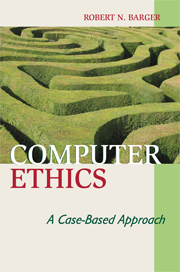Printed SourcesBarabasi, Albert-Laszlo, Freeh, Vincent W., Jeong, Hawoong, and Brockman, Jay B.. “Parasitic Computing.” Nature 412 (30 August 2001): 894–97.
Barger, Robert N., and Crowell, Charles R.. “Ethics of ‘Parasitic Computing’: Fair Use or Abuse of TCP/IP Over the Internet?” In Information Ethics: Privacy and Intellectual Property, edited by Freeman, Lee A. and Peace, A. Graham, 143–61. Hershey, PA: Information Science Publishing, 2005.
Bork, Alfred. “Interactive learning.” American Journal of Physics 47, no. 1 (January 1979): 580–606.
Calabresi, G., and Melamed, D. A.. “Property rules, liability rules and inalienability: One view of the cathedral.” Harvard Business Review 85 (1972): 1089–1128.
Dostoevsky, Fyodor. The Brothers Karamazov. Translated by Constance Garnett. Melbourne: W. Heinemann, 1912.
Dwyer, Thomas. “Some thoughts on computers and greatness in teaching.” SIGCUE:Topics in Instructional Computing 1 (January 1975): 76–80.
Ermann, M. David, Williams, Mary B, and Shauf, Michele S, eds. Computers, Ethics, and Society. Oxford: Oxford University Press, 1997.
Floridi, Luciano, and Sanders, J. W. “Artificial Evil and the Foundations of Computer Ethics.” Ethics and Information Technology 3(1) (2001): 55–66.
Floridi, Luciano, and Sanders, J. W.. “Mapping the foundationalist debate in computer ethics.” Ethics and Information Technology 4 (2002): 1–9.
Gert, Bernard. Morality: Its Nature and Justification. Oxford: Oxford University Press, 1998.
Halverson, William. A Concise Introduction to Philosophy, 4th ed. New York: Random House, 1981.
James, William. “The Moral Philosopher and the Moral Life.” International Journal of Ethics, 1, no. 3 (April 1891): 330-54.
Johnson, Deborah G.Computer Ethics, 2nd ed. Englewood Cliffs, NJ: Prentice Hall, 1994.
Moor, James H. “What is computer ethics?” Metaphilosophy 16, no. 4 (October 1985): 266–75.
Moor, James H.“Just consequentialism and computing.” Ethics and Information Technology 1 (1999): 65–9.
Plato, . The Works of Plato. Edited by Edman, Erwin. Translated by Benjamin Jowett. New York: Random House, 1927. pp. 91–106.
Plato, . The Republic. Translated by Jowett, Benjamin. New York: P. F. Collier and Son, 1901. pp. 253–91.
Rawls, John. A Theory of Justice, rev. ed. Cambridge, MA: Belnap Press of Harvard University Press, 1999.
Ross, Colvin. “An educational philosophical inventory.” Journal of Educational Thought 4, no. 1 (1970): 20–6.
Tavani, Herman. “The uniqueness debate in computer ethics: What exactly is at issue, and why does it matter?” Ethics and Information Technology 4 (2002): 37–54.
Wittgenstein, Ludwig. Tractatus Logico-Philosophicus. Translated by Pears, D. F. and McGuinness, B. F.. London: Routledge & Kegan Paul, 1961.
Electronic sourcesAnderson, Michael, Anderson, Susan Leigh, and Armen, Chris. “Towards Machine Ethics.” <http://people.cs.uu.nl/virginia/aotp/papers/Towards%20Machine%20Ethics.pdf>.
Aristotle, . Nicomachean Ethics. Translated by W. D. Ross. <http://classics.mit.edu/Aristotle/nicomachaen.1.i.html>.
,Association for Computing Machinery, Inc. “ACM: Code of Ethics.” <http://www. acm.org/constitution/code.html>.
,Association for Computing Machinery, Inc. and the Institute for Electrical and Electronics Engineers, Inc. “Software Engineering Code of Ethics and Professional Practice.” <http://www.acm.org/serving/se/code.htm>.
Barger, Josephine C., Barger, Robert N., and Rearden, John J.. “Relationship of students' philosophic orientation to academic field of study.” Paper presented at the annual meeting of the American Educational Studies Association, Chicago, October 25–29, 1989. <http://ux1.eiu.edu/~rnbarger/aesa1989.html>.
,Computer Ethics Institute, “The Ten Commandments of Computer Ethics.” <http://www3.brookings.edu/its/cei/TheTenCommandmentsOfComputerEthics.pdf>.
“,Department of State Washington File: Text: Research on Children, Learning and Computers.” <http://canberra.usembassy.gov/hyper/2001/0130/epf206.htm>.
Freeh, Vincent, Barabasi, Albert-Laszlo, Jeong, Hawoong, and Brockman, Jay. “Parasitic computing.” <http://www.nd.edu/~parasite/>.
Gatta, Mary, and Trigg, Mary. “Bridging the gap: Gender equity in science, engineering and technology.” New Brunswick, NJ: Rutgers University, 2001. <http://www.chr.up.ac.za/ggp/coursematerial/2007/good_gov/elize/Gap%20gender%20and%20science.pdf>.
,Google Censorship FAQ.” March 2, 2007. <http://blog.outer-court.com/archive/2007–03–02-n19.html>.
“,Google: Web Search Help Center.” <http://www.google.com/support/bin/answer.py?answer=17795>.
,Illinois Institute of Technology. “Codes of Ethics Online – Computing and Information Systems.” <http://ethics.iit.edu/codes/computer.html>.
James, William. Pragmatism: A New Name for Some Old Ways of Thinking. New York: Longmans, Green and Co., 1907. <http://www.4literature.net/William_James/Pragmatism/>.
McCormick, Matt. “Immanuel Kant – Metaphysics.” Internet Encyclopedia of Philosophy, <http://www.iep.utm.edu/k/kantmeta.htm#H8>.
McCullagh, Declan. “No booze or jokes for Googlers in China | CNET News.com.” <http://news.com.com/No+booze+or+jokes+for+Googlers+in+China+-page+1/2100–1030_3–6031727.html?tag=item>.
McCullagh, Declan. “No booze or jokes for Googlers in China – page 2 | CNET News.com.” <http://news.com.com/No+booze+or+jokes+for+Googlers+in+China+-+page+2/2100–1030_3–6031727–2.html?tag=st.num>.
McCullagh, Declan. “No booze or jokes for Googlers in China – page 3 | CNET News.com.” <http://news.com.com/No+booze+or+jokes+for+Googlers+in+China+-+page+3/2100–1030_3–6031727–3.html?tag=st.num>.
“,Network Access Layer,” <http://www.pku.edu.cn/academic/research/computer-center/tc/html/TC0200.html>.
O'Connor, J. J. and Robertson, E. F.. “Babbage biography.” <http://www-groups. dcs.st-and.ac.uk/~history/Biographies/Babbage.html>.
O'Connor, J. J. and Robertson, E. F.. “Mathematicians/Hollerith.” <http://www-groups.dcs.st-andrews.ac.uk/%7Ehistory/Mathematicians/Hollerith.html>.
Randall, Alexander, 5th. “Q&A – A lost interview with ENIAC inventor J. Presper Eckert.” <http://www.computerworld.com/hardwaretopics/hardware/story/0,10801,108568,00.html?source=NLT_AM&nid=108568>.
“,RBC [Royal Bank of Canada] Financial Group – RBC Letter.” <http://www.rbc.com/responsibility/letter/september2006.html>.
Sayre-McCord, Geoffrey. “Kant's Grounding for the Metaphysics of Morals: A Very Brief Selective Summary of Sections I and II.” <http://www.unc.edu/~gsmunc/phil22/Kantsum.pdf>.
Searle, John R. “The Problem of Consciousness.” <http://www.ecs.soton.ac.uk/~harnad/Papers/Py104/searle.prob.html>.
Foerster, Heinz. “Responsibilities of Competence,” Journal of Cybernetics 2, no.2 (1972): 1–6, <http://mlab.uiah.fi/~timo/vonfoerster/>.
,World Summit on the Information Society (WSIS). “Basic Information about WSIS.” <http://www.itu.int/wsis/basic/faqs.asp>.
,World Summit on the Information. “Geneva Declaration of Principles.” <http://www.itu.int/wsis/docs/geneva/official/dop.html>.
,World Summit on the Information. “Geneva Plan of Action. < http://www.itu.int/wsis/docs/geneva/official/poa.html>.
,World Summit on the Information. “Tunis Commitment.” < http://www.itu.int/wsis/docs2/tunis/off/7.html>.
,World Summit on the Information. “Tunis Agenda for the Information Society.” <http://www. itu.int/wsis/docs2/tunis/off/6rev1.html>.





